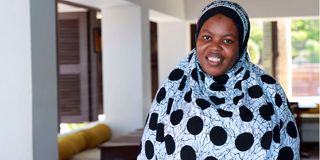Mwanasha Gaserego: Kwale’s defender of widows' rights

Mwanasha Gaserego, founder of Tuwajali Wajane, an organisation that fights for the rights of widows in Kwale County.
What you need to know:
- Mwanasha Gaserego encountered cases of widows under threat of disinheritance by relatives and moneyed individuals at the peak of Covid-19.
- Their experiences prompted her to commit to saving them from their tribulations, a zeal that birthed Tuwajali Wajane Kwale.
- Her organisation is among those that pushed for the launch of the Thamini, an interest-free loan facility meant for widows only.
At the peak of Covid-19 pandemic in Kenya in mid-2020, Mwanasha Gaserego encountered several cases of widows under threat of disinheritance by relatives and moneyed individuals.
“Relatives were throwing widows out with their children during the curfew yet they had the right to their home.”
“There were cases where wealthy people wanted to disinherit the widows,” she says.
Their experiences disturbed her, prompting her to commit to saving them from their tribulations, a zeal that birthed Tuwajali Wajane Kwale (Let's take care of widows in Kwale) in June 2020.
She has since benefitted 800 widows in Msambweni Sub-county, where she is married.
Ms Gaserego says though not a widow, she would relate with the distress of the widows having been raised by a widower.
Her mother died when she had turned 16 and her father single-handedly raised his seven children
“I saw him struggle with grief while trying to balance between being a dad and mum at the same time,” says Ms Gaserego who was born and brought up in Lunga, Kwale County.
“Now imagine a widow who can’t defend herself. She is beaten by her in-laws and her matrimonial property is taken away. Their mental health is severely damaged,” she says.
Widow eviction
These violations are widespread. A report by Federation of Women Lawyers-Kenya on gender-based violence (GBV) cases filed between April 15 and May 5, 2020 did indicate a prevalence of widow eviction and physical violence by in-laws in Western Kenya.
It showed widow eviction cases totalled 10 out of the 289 GBV cases reported during the three-week period.
Ms Gaserego says she first offers the widows psycho-social support to relieve them of their mental suffering before she educates them on their rights to matrimonial property.
“Many of them are psychologically disturbed by months of abuse. You reach them at a time they have given up. They are tired of the constant violence. They want to leave but they don’t know where to go,” she says.
She says her organisation is one among the many fighting for the rights of widows that pushed for the launch of the Thamini, an interest-free loan facility under Women Enterprise Fund (WEF), meant for widows only.
WEF launched the product in July last year. It is, however, accessible to widows in a group of at least 10 members, 70 per cent of whom must be widows. The group must also be operating three months prior to the loan application.
She says she has seen the widows she has empowered speak up against the violations, a development she says motivates her to continue fighting for their rights.
Leadership roles
Her public awareness on the rights of widows has also borne fruit.
She says, the local communities now consider them for leadership roles in social functions.
“They are giving them leadership roles in weddings, something that never happened before,” she says.
Their advocacy with the County Commissioner has also seen them included in the vulnerable group category in the distribution of relief food.
“We are happy that now whenever the County Commissioner distributes relief food, he considers widows as a priority group,” she says.
Currently, she explains, they are advocating for the inclusion of widows in the bursary committees established by the office of the County Woman Representatives.
“How can you talk about the education of an orphan yet you don't live with one?” she asks.
She, however, says lack of resources is a major challenge that constrains her social work. She urges government and development partners to fund human rights defenders’ work.
“Capacity building of women human rights defenders is also key. I’m happy to be in the 2022 cohort of women human rights defenders admitted into the Human Rights Academy by Defenders Coalition. It’s a great opportunity for me to build skills relevant to my work,” she says.
For now, she is able to reach out to the widows courtesy of the financial support extended to her through Fazil Chinoy fellowship.
“This support is short-term yet much support is needed to address the widows’ plight,” she says.
Husband's pension
She calls for laws protective of the widows’ right to their spouse’s pension.
“There is one case of a widow who is yet to receive her husband's pension 15 years since he died, yet she really needs that money to educate her children. Her husband was a police officer,”
“Cases like these require legislative intervention. We need a law that stipulates timelines for releasing pension to a widow or a widower.”
November 29 was International Women Human Rights Defenders Day and fell within the 16 Days of Activism against GBV.
In a statement to mark the campaign period, UN Women Executive Director Sima Bahous called for strengthening of protection mechanisms for women human rights defenders and women’s rights activists.
“No one anywhere ever should face violence or harassment for standing up for what is right and calling for what is necessary,” she said.
For Ms Gaserego, her appeal is to the communities to speak up against GBV among widows.
By speaking out we will be raising awareness about the rights of the widows and widowers and encourage them the report the abuse, she says.
“You can't defend a right that you don't know about. That’s why it’s very important that we first educate the widows and widowers on their rights. Widowers also suffer GBV,” she said.





